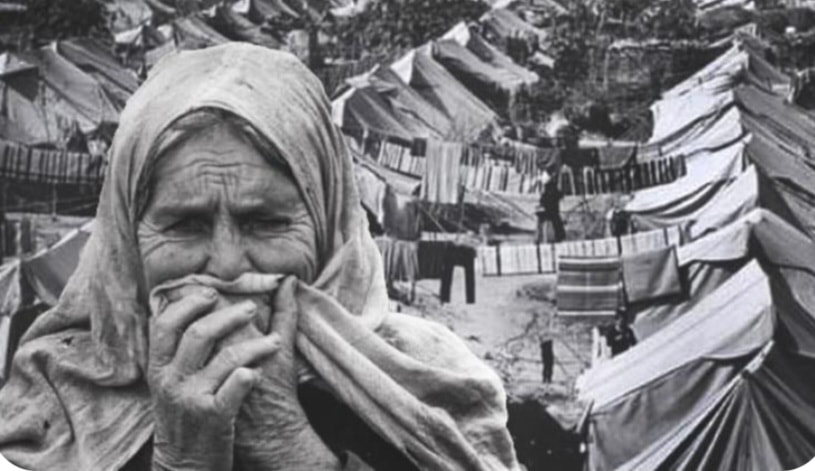|
Her tragedy remained hidden in the Israeli army’s archives for 54 years, recorded in military court testimonies She was abducted on Aug. 12, 1949, 66 years by Israeli soldiers near the Nirim military outpost in the Negev desert, close to the Gaza Strip. The unnamed Palestinian Bedouin girl, in her mid-teens, was then raped and executed.
Her tragedy remained hidden in the Israeli army’s archives for 54 years, recorded in military court testimonies and a single entry in former Prime Minister David Ben-Gurion’s diary, where he referred to it as a “horrific atrocity” in the early years of the state. In 2003, Israeli newspaper Haaretz obtained classified documents including the testimonies of the 20 soldiers involved in the case, and published an article in Hebrew on the account. It did not receive media attention. The girl was brought back to the outpost, where her clothes were pulled off. She was forced under the shower by the platoon sergeant. He washed her down with his own hands, while his fellow soldiers enjoyed the show. She was then taken into a hut and gang-raped by three soldiers. At about 5 p.m., they brought a barber to cut her hair short, after which she was forced to shower once more in front of the officer and sergeant. The second lieutenant ordered the soldiers to prepare for a party. Tables were set up, wine poured and food laid out. Platoon commander ‘Moshe’ gave his soldiers a pep talk on Zionism and the importance of the troops’ contribution to the newly founded state. They read excerpts from the Bible and rejoiced. Just before the end of the party, Moshe gave his soldiers two options regarding their captive: She was either to become a kitchen worker or their sex slave. Most replied: “We want to f***!” The commander drew up a three-day gang-rape schedule for his three squads to alternate. On the first night, he went in with one of his sergeants, Michael. They left her unconscious. When she tried to speak up the next morning, she was executed. Her body was placed in a grave about 30 centimeters deep. Moshe was asked to write a report on what had happened: “In my patrol on 12.8.49 I encountered Arabs in the territory under my command, one of them armed. I killed the armed Arab on the spot and took his weapon. I took the Arab female captive. On the first night the soldiers abused her and the next day I saw fit to remove her from the world.” Moshe was sentenced to 15 years in jail for murder. The other 19 soldiers received sentences between one and three years, mainly for allowing the incident to happen. Only one soldier was convicted of rape, and sentenced to two and a half years in prison. The trials took place in secret. The Military Court of Appeals justified the light sentences, and was quoted as saying: “An attitude of disregard for the lives of Arabs in general and infiltrators in particular was common at the time… all this helped to create an atmosphere of ‘anything goes’.” Dr Nadera Shalhoub-Kevorkian, professor of law at the Hebrew University and a writer on military violence against women in conflict zones, says rape of Palestinian women was used as a military tactic during the 1948 Arab-Israeli war. “We don’t have statistics, but we have documentations of cases. Some of them are very well known, like the case of rape in Qula, and some of them are hidden,” said Shalhoub-Kevorkian. “In my interviews with Palestinian refugee families, many expressed that they ended up fleeing because of the rape. There was terror, horror and fear,” she added. In an interview with journalist Ari Shavit for Haaretz, Israeli historian Benny Morris is quoted as saying that in his research of 1948 in the military archives, he was surprised to find that “there were also many cases of rape,” which usually ended in murder. Shalhoub-Kevorkian says sexual violence is still relevant today, citing Middle East scholar Mordechai Kedar of Bar-Ilan University in Israel. He suggested raping Palestinian mothers and sisters as a solution to Hamas’s armed resistance, on Israeli radio during last summer’s war on Gaza. “It sounds very bad, but that’s the Middle East,” said Kedar. Shalhoub-Kevorkian says sexual violence is prevalent, from the way settlers assault Palestinian women, to how Israeli checkpoints and the occupation control pregnant women’s access to hospitals. “The inscription of power over Palestinian women’s bodies is always there.” Citizen Media Find Precious X Citizen Media Luna's Eyes On The World
0 Comments
Visit Luna Whispering Wolf
ORDER YOUR LWW ART NOW Live Precious X Radio Broadcast
AuthorPrecious X Radio New Inspired by Internet Radio Personality, Citizen Media Journalist, Human and Civil Rights Activist, Music & Video Entertainer, Director, Producer. All post are not taken on a personal support of any side of the issues or topics we report on. We are 100% un bias and simply report the issues that come to us by other citizens and or our resources.
We also stay 100% transparent If we have not been able to confirm what is being reported we make that very clear.  Follow up with our topics and debate by joining our Facebook Debate Group.
(Click Debate Image to direct to our group) Follow up with our topics and debate by joining our Facebook Debate Group.
(Click Debate Image to direct to our group)
Archives
March 2024
Categories |
Hours24/7
|
Telephone |
|





 RSS Feed
RSS Feed